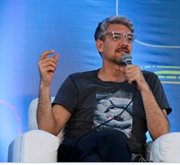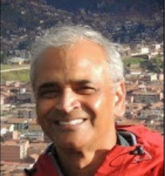Translated from the Spanish by Dipen Bhattacharya
Before going down to the kitchen, I think about the horrors of the chronicle that I have been reading these last days.
This chronicle, which could well be the first report in history, has only six pages, but I have read it countless times: it is the year 46 BC and Tucídides, with crystal clearness, narrates the horrors of the last epidemic that devastated Athens.
Setting aside the evil that attacked the bodies of antiquity, I have breakfast listening to the daily lecture of my president, to whom I had stopped paying attention, before the confinement began, because he used to talk about everything except what he should be talking about .
A few days ago, I was having breakfast. Just like today and yesterday – toast, a piece of avocado and several strands of cheese. It dawned on me, for the first time in several months, perhaps even in years that I wanted him, The president, the highest authority in my country, to talk about something else, about anything other than this one that seems to have him tied to the monotheme: the coronavirus.
During political, social, cultural or economic crises, we human beings generally assume that there is no other way out of the quagmire than by digging the hole deeper and deeper in which we are trapped. It is thus, however, that we condemn ourselves to repetition and inaction. This is how we ensure, then, that the crises, in which we sink repeatedly, are always waiting for us, shortly after we believe we have overcome them. We tend to believe that the horizon exists only on one axis.
As I will surely do tomorrow as well, just a moment ago I turned off the radio, knowing that my president was about to finish his talk as on each day of his administration. Then I put the cheese in the refrigerator and, with my fingers twisted into tweezers, I brought a huge piece of chorizo to my mouth, which dripped from the corners of my lips. A little over two weeks ago, although it could also have been a month, I stopped caring about cholesterol, how I stopped caring about diseases that are not caused by a virus, and how I stopped caring about the names of the days.
For those same days, whose names, I have just said, do not matter to me (Small unexpected triumphs but at the same time a million times desired from confinement. Although I know that those names will come back in the immediate future, ready to hit me in the face as soon as I have really forgotten them). I stopped caring about almost all my future plans. I stopped showing interest in the fate of oil bonds and emigrants’ remittances. I stopped paying attention to the race between the most powerful nations on the planet for inaugurating mining on the moon and the results of the European football leagues no longer seemed essential to me.
And it is that the pandemic came, in addition to robbing me of my hypochondria, to rob me of almost all my obsessions: those whose origin lay within me, or so I believed, and those that the system had imposed on me, or so I thought. Now it turns out that, out there, there is a real and ruthless disease, an evil ready to enter our bodies and squirt, with our cells, the corners of its multiple snouts. Now it turns out that, out there, there is a perverse, true and violent evil. A disease that came accompanied by a new reality, a reality that is but another crisis and that is also ready to enter the space between our bodies and the functioning of the system, dripping, with our being in the world, the corners of its multiple snouts.
—The repetition of our political, social, cultural or economic crises, but, above all, the repetition of our attitudes, responses and obsessions to find specific solutions instead of systemic ones, makes it clear that, in addition to being a species that, like Paired racehorses, is only able to see the axis on which it runs. We are a species that if one draws comparison to something intangible, come close to the echo: the wave of a sound that bounces off any surface, while thinning and fading, without any awareness of its end. The worst thing, however, is that we no longer know who produced the original sound, which could well be called progress.
With the corners of his mouth still stained with grease and accompanied by my remaining dogs, the oldest passed away a week ago; happy to die on a nameless day so that his memory, unlike his life, would not be tied to any calendar (Capulín knew which nails that fix time to progress). Accompanied by my dogs, he said, those who observe the door of the house with the courage with which men do not dare to look at the mouth of that hole in which crises plunge us, since their walks have been reduced to a minimum, I go through the dining room and the living room.
I lock myself in my study. And there, like yesterday and tomorrow, my head breaks into a thousand pieces. Unfortunately, they are pieces of the same idea. It is not a universe of ideas. At my desk, then, I accept that I will not be able to work, read, or concentrate. If I do not first renounce this obsession that they imposed on me which tells me that the pandemic is just a pandemic. that I will not be able to get rid of this loss, which is like bringing a diving sui. If I do not accept first that this is an echo within my body and not outside it.
And I also accept that I will not be able to stop living inside of this disinfectant gel, If I do not sterilize, if I do not purify my memory, my reason and my imagination, if I do not dirty, if I do not contaminate, if I do not intoxicate the memory, the reason and the imagination that someone else inoculated within me, so that I could not remember or think or invent the stratosphere, the sky, the air, the space that separates me from others and that which is inside me.
—If the echo that separates us and prevents us from seeing our interior is called progress, we should challenge all its assumptions. And by challenging the assumptions that we drag that have given rise to each of the crises we have faced, be they political, social, cultural or economic, it is the only way to emerge being others from the hole.
Exhausted, like every day of these months, I flop into the chair at the other end of my study and wonder: could I invent a new language? A language in which the words economy and happiness, for example, were new hinges?
Before I get up, however, the rotting bodies of Thucydides crush me, although in a different way. And suddenly I see his illness as benevolent.
Its last symptom, after all, was erasing the memory of the patient.



























0 Comments